|
This is an excellent resource for anyone researching Henry Kissinger's war crimes. Lots of links to further information can be accessed by going to the original article.
From The National Security Archive | Original Article
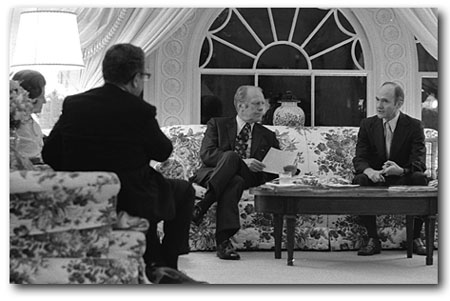
President Ford discusses the evacuation of Saigon with Henry Kissinger and Brent Scowcroft, late at night on 28 April 1975, with First Lady Betty Ford looking on (copy from the collections of the Gerald R. Ford Presidential Library, Image A4233-07A)
Washington, D.C., August 19, 2015 – President Gerald Ford was "offended" and Secretary of State Henry Kissinger "almost blind with rage" over Israeli negotiating behavior in 1975, according to newly released Kissinger telephone transcripts obtained through a Freedom of Information Act lawsuit and posted today by the National Security Archive.
The 905 telcons released in full contain highest-level verbatim conversations between Kissinger and a wide range of officials and journalists about the evacuation of Saigon at the end of the Vietnam War, the crisis in Cyprus, Middle East negotiations, revelations of CIA misdeeds, Ronald Reagan's challenge to Ford in the 1976 primaries, and other topics, along with candid remarks never meant for public view about personalities ranging from Donald Rumsfeld to then CIA Director William Colby. About Colby's cooperation with Congressional investigations into the CIA, Kissinger commented, "You accuse him of a traffic violation, and he confesses murder."
The State Department released the new telcons only after the Archive brought a Freedom of Information Act lawsuit challenging the Department's eight-year delay in processing the Archive's appeal for the documents. Previously, Archive legal action in 2001 had convinced State to recover the telcons from the Library of Congress, where Kissinger had placed them under seal until five years after his death. The Archive has obtained and published more than 15,000 of the telephone transcripts through the ProQuest subscription series, the Digital National Security Archive, and these 900+ were the last remaining unreleased.
During an interval between meetings in Washington with Israeli Prime Minister Yitzhak Rabin in June 1975, President Gerald R. Ford told Secretary of State Henry Kissinger over the telephone that he had been “offended” by Rabin’s attitude during negotiations over the withdrawal of Israeli forces from the Sinai Peninsula. Kissinger agreed that the “way in which he treated us was outrageous.” In an earlier telephone conversation, Kissinger and Under Secretary of State Joseph Sisco agreed that Ford had “handled” the matter “admirably” with the Israeli officials because it was clear the President “doesn’t like them anymore.” The two State Department officials also shared the view that the Israeli leadership “was very difficult to like at this point.”
The exasperated comments by Ford, Kissinger, and Sisco reflected tensions in U.S.-Israeli relations during mid-1975; Kissinger had been using “shuttle diplomacy” to facilitate the further disengagement of Israeli forces from Egyptian territory in the Sinai, but the talks had stalled mainly due to Israeli opposition. While some would argue U.S.-Israeli relations have reached their nadir over the recent Iran nuclear negotiations, evidence from the not-too-distant past is a useful reminder that even during Republican administrations the ties between the two countries have sometimes frayed.
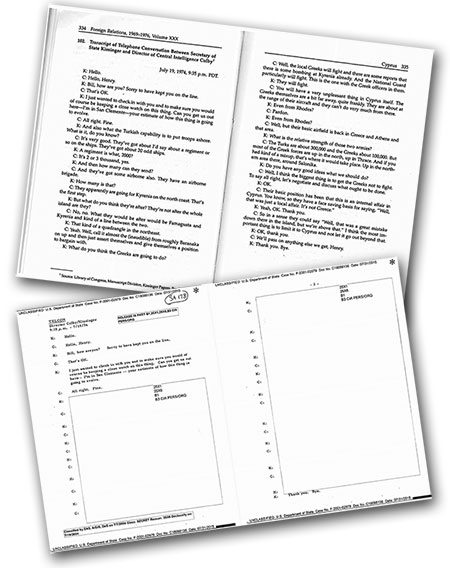
Dramatically differing versions of the Kissinger-Colby conversation, 19 July 1974, as published in the State Department historical series, Foreign Relations of the United States, and as released in August 2015 by the State Department in response to the Archive's lawsuit.
The newly obtained Kissinger materials cover some of the extensive terrain of the former secretary of state’s interests in the mid-1970s, ranging from the withdrawal from Vietnam to the tree-chopping episode in North Korea to the crisis in Cyprus. As with previous releases, they also provide sometimes strong personal views about leading public figures from the time, from Defense Secretary and Cabinet rival James Schlesinger to New York Times reporter Seymour Hersh, who was beginning to publish ground-breaking revelations about past CIA abuses. Other telcons published today document:
- reactions to Seymour Hersh’s New York Times story in December 1974 revealing information about the CIA “Family Jewels”
- U.S. policy during the final days of the Government of South Vietnam, including Kissinger’s moves to “get rid” of President Nguyen Van Thieu by compelling his resignation
- reactions by Kennedy family associates McGeorge Bundy and Adam Walinsky to a New York Times story about National Security Council documents from the early 1960s about assassination plots in the Caribbean
- President Ford’s reaction to the attempted assassination by Manson family associate “Squeaky” Fromme in September 1975
- a discussion with former President Nixon about Ronald Reagan’s attacks on détente, which Nixon saw as a “tragedy.”
- Kissinger’s doubt about reports that Israel had readied nuclear weapons during the 1973 war, suggesting that spreading such disinformation was the action of a “sick” government
- Kissinger’s disagreement with Arms Control and Disarmament Agency chief Fred Ikle over SALT II: “I do not understand how the Arms Control Agency can put itself to the right of the Secretary of State on issue after issue.”
The new Kissinger telcons illuminate nearly every aspect of U.S. foreign relations and national security policy from the last weeks of the Nixon administration to the final days of the Ford presidency. Topics include the Cyprus crisis and negotiations, the end of the Vietnam War, the Middle East negotiations, the 1976 civil war in Lebanon, the CIA investigations of 1974-1975, SALT II and the vicissitudes of détente, and Republican Party politics, among other matters.
Hundreds of the conversations are with Brent Scowcroft, who served as deputy national security adviser between August 1973 and October 1975 and as national security adviser until 21 January 1977. Many of the conversations are with President Ford; other interlocutors include Ambassador to the United Nations Daniel Pat Moynihan, Directors of Central Intelligence William Colby and George H. W. Bush, Vice President Nelson Rockefeller, former President Richard M. Nixon, White House Chief of Staff Alexander M. Haig, Secretary of Defense James Schlesinger, Donald Rumsfeld (as White House Chief of Staff and then as Secretary of Defense), Treasury Secretary William Simon, a variety of State Department officials, newspaper reporters, and ambassadors and foreign ministers.
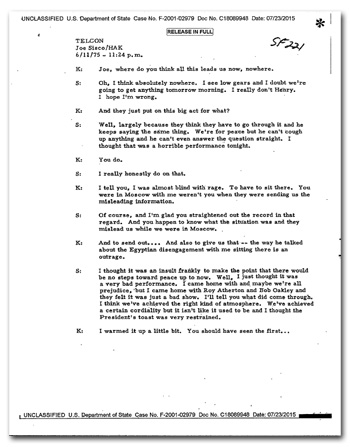
Kissinger Tells Under Secretary of State Joseph Sisco That He Was "Almost Blind with Rage" During the Dinner with Rabin That Evening.
Documents
Documents 1A-C: The Cyprus Crisis: Kissinger vs. Schlesinger
A. Telcon Director Colby/Kissinger, July 19, 1974, 9:35 p.m.
B. Conversation between Secretary Kissinger and General Haig, July 21 [1974] – 10:50, excised copy
C. Telcon Secretary Schlesinger/ Secretary Kissinger, August 19, 1974 12:30 p.m.
Early in the Cyprus Crisis, before the Turks landed troops, Kissinger received a briefing over the telephone from Director of Central Intelligence William Colby on Turkish capabilities and the situation on the island. The version received from the State Department is massively excised, but the Department declassified it for the Foreign Relations of the United States historical series years ago, in 2007.
During the crisis, the rivalrous-cooperative relationship between Kissinger and secretary of defense James Schlesinger manifested itself. At a meeting of the Washington Special Actions Group (WSAG) Schlesinger supported the overthrow of the Greek Junta, which had instigated the crisis, but in light of the Turkish invasion intended to prevent a takeover by Athens, Kissinger thought it more important to seek a cease-fire. Recalling differences with Schlesinger during the October War, Kissinger told White House Chief of Staff Alexander Haig that “we cannot go through another crisis under this man.” A month later, Schlesinger wanted to send General Andrew Goodpaster to meet with the Turkish General Staff (TGS) as a warning that Turkish action in Cyprus was endangering relations with Washington but Kissinger strongly disagreed: “If you want to do my job, you can come over here. … I will not have this.”
Documents 2A-C: Revelation of the “Family Jewels”
A. Telcon Rumsfeld Sec. Kissinger, December 23, 1974, 9:35 a.m.
B. Telcon (Secure Phone), Bill Colby Sec. Kissinger, December 23, 1974, 9:40 a.m., excised copy
C. Telcon Ted Koppel Sec. Kissinger, December 23, 1974, 11:20 a.m.
Seymour Hersh’s front page New York Times story on Sunday, 22 December 1974, revealed CIA operations conducted during the tenure of DCI Richard Helms against U.S. anti-Vietnam war movements to trace alleged connections with “international Communism.” The story helped to generate a collection of reports, known to insiders as the "Family Jewels" , that CIA officials had prepared for former DCI James Schlesinger after he demanded information on “questionable” CIA activities during the l960s.[1] The day after the story, Kissinger spoke successively with White House Chief of Staff Donald Rumsfeld and CIA Director William Colby about the Hersh revelations. Kissinger called Hersh a “son-of-a-bitch,” but claimed he did not know about the activities himself and agreed with Rumsfeld that Colby should prepare a report for the President. A few minutes later, Colby briefed Kissinger on the CIA reports. Portions of this telcon are excised, but given the public record status of the “Family Jewels,” it seems highly unlikely that the redacted information is not already in the declassified record.
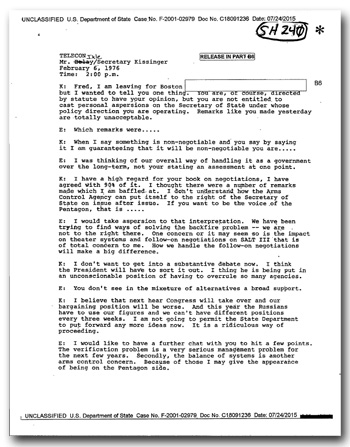
Facing Dissent on SALT, Kissinger Wonders How the "Arms Control Agency Can Put Itself to the Right of the Secretary of State on Issue After Issues."
Later in the morning, Kissinger received a call from ABC correspondent Ted Koppel, who had questions about the reports. Denying the “basic allegation that Americans were being investigated,” Kissinger said he was “so sick of these things.” When Koppel wanted to be sure if the CIA studies were on “foreign students,” Kissinger replied somewhat loosely: “I think it did not have anything to do with this country.”
Documents 3A-C: The Collapse of Saigon
A. Telcon President Ford/Secretary Kissinger, April 1, 1975, 7:15 p.m.
B. Telcon President Ford/Secretary Kissinger, April 18, 1975, 10:10 p.m.
C. Telcon Secretary Kissinger Secretary Schlesinger, 29 April 1975, 1:45 p.m.
A number of the telcons illuminate U.S. decision-making during the final stages of the Vietnam War, as North Vietnamese forces launched successful offensives against the South and reached Saigon by month’s end. On April 1, with Ford in Vail, Colorado, on holiday, Kissinger briefed him on plans to evacuate 200 Americans from Phnom Penh (Cambodia), discussed arrangements for a speech to solicit more aid for that country, and the beginning of secret contingency planning for an evacuation of Saigon.
Congress was in no mood to prolong the agony by authorizing further resources to Cambodia or South Vietnam. On 18 April, the day after the Khmer Republic fell to Khmer Rouge forces, Kissinger told Ford that “we may have from 4 to 10 days and we have to figure [that] by next weekend, at the worst, it will be over” in South Vietnam. Kissinger said he would ask the Soviets, through Soviet Ambassador Anatoly Dobrynin, for a “temporary cease-fire” so that U.S. nationals and their Vietnamese dependents could be evacuated. Hanoi might want to take over “under controlled conditions.” Inducing South Vietnamese president Thieu to depart was part of the plan. Kissinger told Ford that “we can [jettison] him as soon as we get an answer from the Russians.” “Getting rid” of Thieu would be part of an understanding with Hanoi and Moscow designed to give Washington and perhaps the Saigon regime more time. In keeping with arrangements that Kissinger was making with Ambassador Graham Martin, the latter presented Thieu with a demarche to resign but he soon left the country on his own steam. The North Vietnamese told Kissinger, through Ambassador Dobrynin, that they would not interfere with the U.S. evacuation, but the Saigon regime, whether Thieu was president or not, had no more time.
By the months’ end Ford decided “to terminate the thing” and Kissinger and Schlesinger discussed logistical arrangements for the final evacuation of Saigon. Schlesinger said to Kissinger: “I would say God-dammit this is the end.”
Documents 4A-C: Tensions with Israel: “I Was Almost Blind with Rage”
A. Telcon Joe Sisco/HAK 11 June 1975, 11:24 a.m.
B. Telcon The President/The Secretary, 15 June 1975, 3:20 p.m.
C. Telcon General Scowcroft/Secretary Kissinger, 22 July 1975, 2:54 p.m.
During the months after the 1973 October War, Kissinger’s shuttle diplomacy was initially successful in facilitating interim Israeli-Egyptian and Israeli-Syrian agreements. But by 1975, progress had stopped and Kissinger’s efforts relating to Jordan and further progress on disengagement from Egypt had stalled, mainly due to Israeli opposition. This created hard feelings at high levels in Washington.[2] During Israeli Prime Minister Yitzhak Rabin’s U.S. visit in June 1975, Kissinger and Under Secretary of State Joseph Sisco commiserated with each other over past and current Israeli behavior: including providing “misleading information” during a crucial stage of the 1973 October War and more recently stonewalling in the negotiations to pull Israeli forces further back from their positions in Egyptian territory in the Sinai. Both agreed that during the meetings with Rabin, President Ford had “handled it admirably” because “he doesn’t like them anymore.” Sisco and Kissinger further agreed that the Israeli leadership “was very difficult to like at this point.” Had Gold Meier “ever [been] that obnoxious?” Kissinger asked.

Facing Dissent on SALT, Kissinger Wonders How the "Arms Control Agency Can Put Itself to the Right of the Secretary of State on Issue After Issues."
A few weeks later, the Egyptians were due to provide a map showing the basis of their disengagement counterproposal. The map was not yet available and Kissinger explained that the Israelis would not meet with the U.S. until the “map gets here.” The usually cool Scowcroft protested, “How the hell can they do that! They can’t refuse to meet with us.” Kissinger jokingly rebuked him: “Get your god damned temper under control. I have been screaming about it.” That touched off more angry discussion about Israeli diplomacy
Documents 5A-C: The Church Committee and the Assassination Plots
A. Telcon McGeorge Bundy/ Secretary Kissinger, June 17 1975, 10:05 a.m.
B. Telcon Secretary Kissinger Adam Walinsky, June 17, 1975, 12:55 p.m.
C. Telcon General Scowcroft/Secretary Kissinger, June 18, 1975, 9:00 a.m.
On 17 June 1975 the New York Times published an article by Nicholas Horrock entitled, “Ford Weighs 1959-63 Data on Death Plots,” concerning the White House review, at the request of the Church Committee, of National Security Council documents relating to assassination plots in the Caribbean during the Eisenhower/Kennedy period. That same day, Kissinger received dismayed phone calls from McGeorge Bundy, President Kennedy’s national security adviser, and Adam Walinsky, who had worked for Robert F. Kennedy at the Justice Department and in the Senate. Kissinger told both that he had totally opposed the document production because presidents should not be involved in investigating what their predecessors had done. He partly blamed Colby, “a psychopath who’s running the CIA. You accuse him of a traffic violation and he confesses murder.”
Walinsky wanted a White House retraction or denial that the documents had shown any such thing about assassination plots. Kissinger agreed to “publish” one the next day and later told Bundy the same thing. There may have been some wishful thinking that Horrock (misspelled as “Horax”) would make a retraction because it was to no avail. The next day White House Press Secretary Ron Nessen would neither confirm nor deny the story. Kissinger observed that “when Walinsky and Bundy read this they will go into orbit.”
Document 6: “One of those surprising things”: “Squeaky” Fromme’s Attempted Assassination of President Ford.
Telcon President Ford Sec. Kissinger, September 5, 1975, 7:22 p.m.
Earlier the day that this conversation took place, Charles Manson follower Lynnette Fromme tried to shoot President Ford during his visit to Sacramento. Calling Ford to express his concern, Kissinger learned that the President had seen the gun. Ford said “I could not say it was actually pointed at me. It was there and I saw it.” By that time, as noted in the reference to the “Middle East settlement,” Kissinger had finessed a modest disengagement agreement (Sinai II) at the heavy price of $2.6 billion in aid to Israel.
Documents 7A-B: The “Halloween Massacre”
A. Telcon President Ford/The Secretary, November 1, 1975, 6:05 p.m.
B. Telcon Lloyd [Shearer] Sec. Kissinger, November 7, 1975, 12:15 p.m.
During a phone call with President Ford, Kissinger shared his concerns that rumors about his losing his job as national security adviser were reaching to the press, through leaks by White House Chief of Staff Donald Rumsfeld and White House counsel Jack Marsh, before the official announcement. On 25 October Kissinger had learned of his demotion, which was part of a shake-up orchestrated by Ford’s political advisers who worried that reports about “internal anarchy” at the White House contributed to the President’s declining popularity. The shakeup involved clipping Kissinger’s wings, ousting individuals who had lost favor, and promoting figures in Ford’s inner circle. James Schlesinger, whom Ford had come to dislike, was out as Secretary of Defense, Donald Rumsfeld took his place. Richard Cheney would replace Rumsfeld as chief of staff. William Colby was out as DCI and the hope was that George H.W. Bush, the U.S. envoy in Beijing, would take that job. Vice President Nelson Rockefeller would not be Ford’s running mate in the 1976 election. The new national security adviser would be Scowcroft, with whom Kissinger was close, but his major policy preferences would be adversely affected by Rumsfeld’s ascendancy.[3]
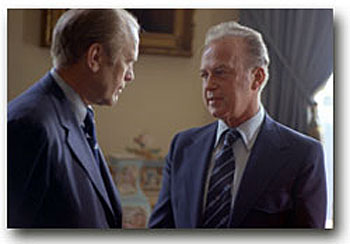
President Ford Meets with Israeli Prime Minister Yitzhak Rabin, 10 September 1974, at a White House reception following Rabin’s arrival ceremony(copy from the collections of the Gerard R. Library, Image: A0670-27A)
The shakeup did not become officially public until 2 November. In the meantime, Ford wanted to communicate his CIA offer to Bush, then in Beijing, and Kissinger told him that he would send it through the most secure communication channel. Another complication was that David Packard, one of the founders of Hewlett-Packard, had resigned as chairman of the finance committee of the Ford presidential campaign organization. Ford wanted to offer that job to Ambassador to the United Kingdom Elliott Richardson. While Kissinger said that Richardson was “basically a skunk,” he told him that the offer could be transmitted by a secure phone.
Before Kissinger brought up the leaks about the shake-up, he told the President that Dan Schorr, correspondent of CBS News, had gotten information, apparently from Otis Pike’s House Intelligence Committee, about CIA support to Kurdish rebels in Iraq. Kissinger worried that “every covert operation is out in the open.” But Kissinger had kept one thing bottled up: a State Department dissent memorandum by Thomas Boyatt about the U.S. intelligence failure prior to the coup against Archbishop Makarios in Cyprus in July 1974.
A week later Lloyd Shearer, the author of Parade Magazine’s “Walter Scott’s Personality Parade,” tried to get Kissinger to talk about what happened. Shearer gave his opinions, trying to get Kissinger to open up, but the latter was tight lipped and would only acknowledge that none of it was his idea (and that an unspecified story in the Washington Star was 80 percent accurate). That he apparently played a role in Colby’s ouster he did not mention. At the end of the conversation Kissinger told Shearer that his son-in-law, Time Magazine writer (and future Clinton administration senior official) Strobe Talbott, was a “decent guy,” and “you don’t deserve a decent guy.” Shearer observed that “you have wrapped him around your thumb” owing to Kissinger’s mesmerizing skills.
Document 8: “There is No Way We Can Recapture [Overwhelming American Superiority]”
Telcon President Nixon/Secretary Kissinger, January 3, 1976, 6:07 p.m.
Former President Nixon made occasional calls to Kissinger and reports that Ronald Reagan was making attacks on détente a centerpiece of his presidential campaign troubled both of them. Nixon saw this as a “tragedy” and Kissinger said there was no alternative policy. “The concept of détente doesn’t mean that you don’t resist the Soviet Union when it makes a move.” But Washington had to find ways to work with Moscow because the latter “was becoming a truly great power.” A situation of “overwhelming American superiority” no longer existed and could not be recaptured. But in light of the new political circumstances, détente would soon be a forbidden word in the Ford administration’s public vocabulary.
Documents 9A-B: Pressures on SALT II
A. Telcon Mr. Ikle/Secretary Kissinger, February 7, 1976, Time: 2:00 p.m.
B. Telcon Sec Kissinger/Bill Clements, February 10, 1976, 3:20 p.m.
Kissinger came close to reaching an understanding on SALT II with the Soviets during his visit to Moscow in January 1976 but moves by the Defense Department made an understanding more unattainable than ever. The tensions within the administration and the degree to which Kissinger was feeling beleaguered in a hostile political environment were evident in discussions with Arms Control and Disarmament Agency director Fred Ikle and Deputy Secretary of Defense William Clement. Dressing Ikle down for expressing dissent during a recent meeting, Kissinger said that he could not “understand how the Arms Control Agency can put itself to the right of the Secretary of State on issue after issue.” Ikle believed that he was making a legitimate point and wanted to discuss matters further with Kissinger, who was willing to, but was also getting tired of the whole business. Kissinger’s discontent was evident in a discussion with Clements, when he complained about JCS Chairman George Brown’s “sneering tone” and articles in The Washington Post and Time Magazine about internal disagreements within the administration.
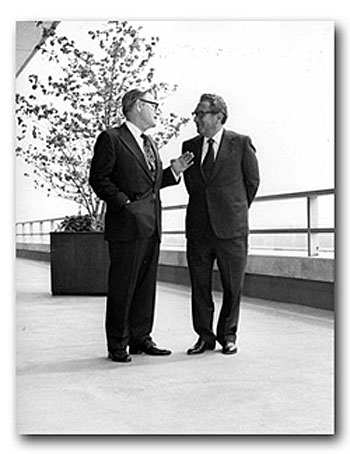
Kissinger and newly-appointed Vice President Nelson Rockefeller, who had been Kissinger’s patron since the late 1950s, 20 August 1974 (National Archives and Records Administration, Still Pictures Division, RG 59-BP, box 36, VS 873-74)
Document 10: “You Know It Never Happened”: Telcon General Scowcroft/Secretary Kissinger 1 April 1976 7:23 p.m.
For years it has been alleged that during the October 1973 Arab-Israeli war, when the fighting at the Golan Heights was especially tense, the Israeli military assembled a number of nuclear weapons for the worst case situation. According to the story, the U.S. DEFCON III alert was called partly in response to the Israeli action. This conversation sheds light on how the story emerged in early 1976. According to Scowcroft, Time Magazine writer Jerrold Schechter received information from Israeli sources, passed it on to Scowcroft, who then informed Kissinger. Both Scowcroft and Kissinger agreed that “it never happened,” with Scowcroft claiming that it was “total hogwash” and wondering whether the Israelis were using it “to frighten the Arabs or something.” Kissinger suggested that the spreading of this disinformation was the action of a “sick” government.
Some may raise questions whether Kissinger and Scowcroft fully remembered the events. Certainly, mysteries abound about the nuclear dimension of the October 1973 Arab-Israeli War, for example, whether U.S. intelligence detected that Israel had put Jericho I missiles on higher alert. Nevertheless, Avner Cohen has raised serious doubts about what he sees as a “mythology” about nuclear weapons during the October 1973. Cohen has recast the story: drawing on interviews, he has found that early in the conflict Defense Minister Moshe Dayan proposed preparations so that Israel’s nuclear capabilities could be “demonstrated”, but Prime Minister Meir rejected any such proposal. Plainly more needs to be learned about the history of the October War, but this Kissinger-Scowcroft conversation makes it more difficult to credit the original story of nuclear events in Israel.
Document 11: “How Can the President Permit This to Happen”?
Telcon The Secretary/Vice President Rockefeller 17 August 1976 6:20 pm
During the months before the Republican convention in August 1976, the challenge posed by former California governor Ronald Reagan became increasingly formidable and right wing elements in the party repudiated White House diplomacy. By the time of the convention, President Ford’s representative in the platform negotiations, Michael-Raoul Duval had agreed, in talks with Reagan adviser Martin Anderson, to a platform in which the section on “morality” and foreign policy denounced “secret agreements,” criticized the Helsinki Treaty, and, as a slam against détente, rejected “unilateral favors” made with the hope of “getting future favors in return.” Kissinger was dismayed and wondered how “the President [can] permit this to happen and not look like a weak coward?” But, as Kissinger also observed, Ford was more interested in blocking the proposed section 16(c) of the platform which required the nominee to name his running made in advance of his official nomination. Ford won on 16 (c), and the only area in foreign policy where his representatives fought was to block language defining the Panama Canal Zone as U.S. territory.
Document 12A-B: “We Feel Unfulfilled About This”
A. Telcon Sec Kissinger President Ford, 18 August 1976 1:10 p.m.
B. Telcon General Scowcroft/Secretary Kissinger 20 August 1976 8:04 p.m.
The day after Kissinger and Rockefeller agonized over the Republican platform, a party of South Korean soldiers accompanied by two U.S. Army officers began to prune a tree in the Joint Security Area located in the Demilitarized Zone between North and South Korea. The tree was blocking the view from the UN command post. North Korean soldiers set upon the U.S.-South Korean party and brutally killed the Americans. On the day of the incident, Ford and Kissinger briefly discussed it, with Kissinger telling him of his proposal for the WSAG meeting that U.S. forces in Korea be put on higher alert along with an already-scheduled B-52 exercise in the area. Both agreed on the need to “show a reaction.” The WSAG met and discussed possible responses, including action to cut down the tree backed by a show of force. Two days later the U.S. and the South Koreans carried out “Operation Paul Bunyan,” to cut down the tree. The North Koreans did not interfere.
In a conversation with Scowcroft soon after the operation, Kissinger made an insensitive comment about “shipping home those two guys in a coffin made out of that tree,” but the comment almost certainly reflected his discontent with the U.S. response. Both Kissinger and Scowcroft agreed that the U.S. should have been tougher, for example, shelling the North Korean barracks. Kissinger asked Scowcroft to tell the President that “we feel unfulfilled about this and what does he think.”
Kissinger and Scowcroft also reviewed a conversation with President Ford earlier in the day (probably a phone call that Kissinger made after midnight. Kissinger may have directly raised his unhappiness with the platform developments and told Ford, in so many words, that he “was unenchanted with him.” After Scowcroft told Kissinger that he had been “really good,” the latter observed that “when you don’t give a damn it isn’t hard.”
Notes
[1]. For the content of the “Family Jewels” and their creation, see John Prados, The Family Jewels: the CIA, Secrecy, and Presidential Power (Austin: University of Texas Press, 2013), 12-59, 65-79, 113-121, and 139-175
[2]. For background, see William Quandt, Peace Process: American Diplomacy and the Arab-Israeli Conflict Since 1967 (Washington, D.C.: Brookings Institution, 2001), 162-171. For an early account, based on inside information, of the acrimony in U.S.-Israeli relations during this period, see Matii Golan, The Secret Conversations of Henry Kissinger: Step-by-Step Diplomacy in the Middle East (New York: Quadrangle/The New York Times Book Company, 1976).
[3]. For a useful account see Walter Isaacson, Kissinger: A Biography (New York: Simon and Shuster, 1992), 669-671.
|